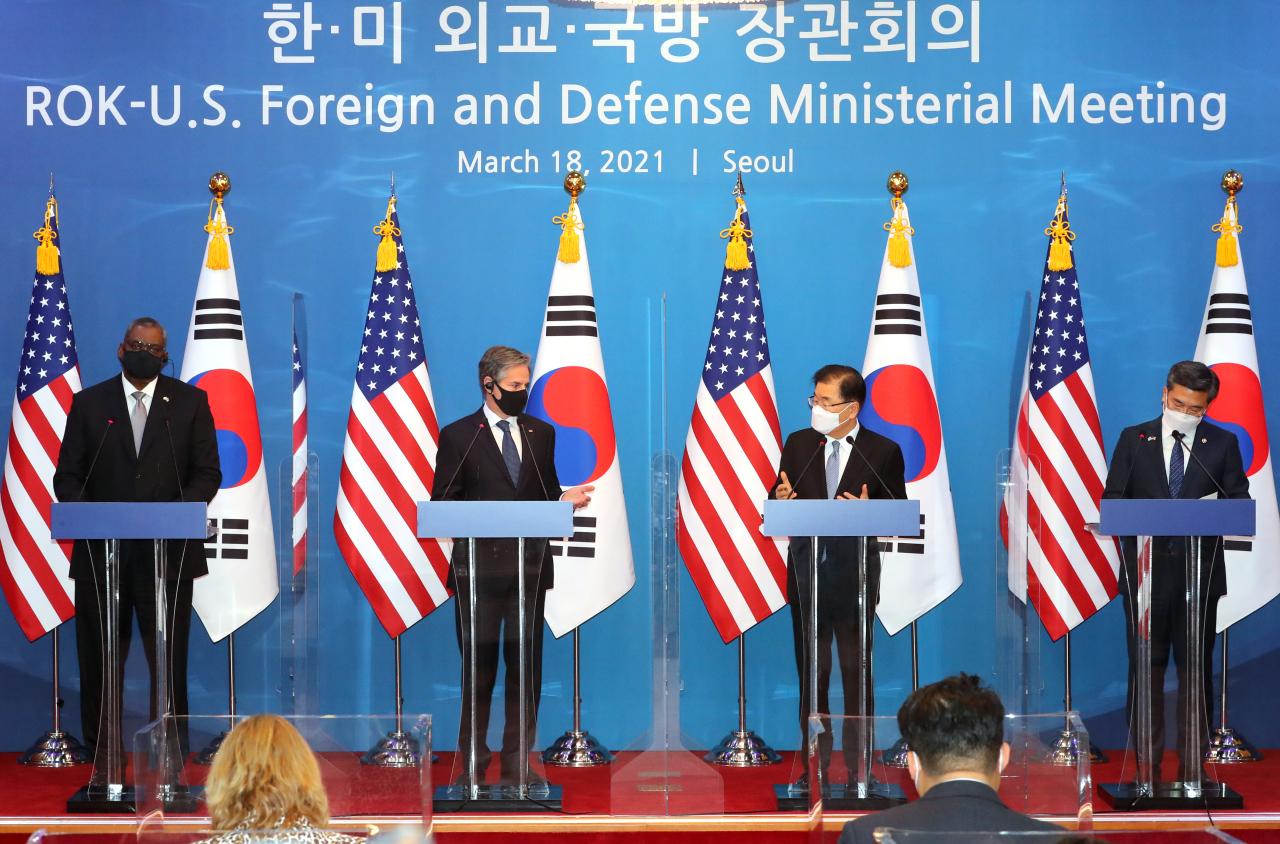Korea, US set NK nuclear, missile issue as priority for alliance
By Ahn Sung-miPublished : March 18, 2021 - 15:45

South Korea and the US on Thursday stressed that North Korea’s nuclear and ballistic missile issues are a “priority” for the alliance, while Washington renewed pressure on Beijing to use its influence to convince Pyongyang to denuclearize.
The two allies issued a joint statement detailing the pledge, after the “two-plus-two” talks at the Foreign Ministry in Seoul earlier in the day, which involved South Korea’s Foreign Minister Chung Eui-yong and Defense Minister Suh Wook, and US Secretary of State Antony Blinken and Secretary of Defense Lloyd Austin.
“The Ministers and Secretaries emphasized that North Korean nuclear and ballistic missile issues are a priority for the Alliance, and reaffirmed a shared commitment to address and resolve these issues,” the statement read. “They affirmed the importance of full implementation of relevant UN Security Council resolutions by the international community, including North Korea.”
The officials also pledged to coordinate closely on all issues related to the Korean Peninsula, and to maintain high-level consultations on the US’ ongoing North Korea policy review, which Blinken said would be completed in the weeks ahead.
The top diplomat said the US is considering both pressure and diplomatic options in the ongoing policy review, but he declined to give details.
The two sides also underscored the importance of three-way cooperation with Japan, in dealing with the North’s denuclearization and other regional issues, echoing earlier calls made by Blinken and Austin during their visit to Tokyo.
While condemning China’s assertiveness has been a mainstream focus for US officials during their Asia trip, Blinken also acknowledged that Beijing has a “critical role to play” in persuading Pyongyang to abandon its nuclear program, given its “unique relationship” and “tremendous influence” on the regime.
“Beijing has an interest, a clear self-interest in helping to pursue the denuclearization of the DPRK, because it is a source of instability. It’s a source of danger and obviously a threat to us and our partners,” said Blinken, stressing that China has an obligation under the UN Security Council resolutions to implement sanctions against the regime. DPRK refers to the formal name for North Korea, the Democratic People’s Republic of Korea.
“China has a unique relationship with North Korea,” he said, indicating that virtually all of the North’s trade goes through China. “So I would hope that whatever happens going forward, China will use that influence effectively to work on moving North Korea to denuclearization.”
The top US diplomat doubled down in condemning China’s “aggressive and authoritarian” behavior in the region.
“We are clear-eyed about Beijing’s consistent failure to uphold its commitments. And we spoke about how Beijing’s aggressive and authoritarian behavior are challenging the stability, security and prosperity of the Indo-Pacific region.”
While US officials took aim at Beijing during their remarks, China was absent in the joint statement issued by Seoul and Washington. This is in contrast to a similar statement issued between Tokyo and Washington on Tuesday, where the two countries strongly condemned China’s behavior as “inconsistent with the existing international order” and as a threat to regional peace and security.
Such different wording refers to Seoul’s hesitance to be aligned with Washington’s China-bashing, in fear of angering Beijing, which is Seoul’s key economic partner, experts say.
“Washington is aware of Seoul’s careful stance,” said Choi Kang, vice president of the Asan Institute for Policy Studies in Seoul. “But it is important for Seoul to take a firm stance on China, without making that too public, and give the impression that it is aligning with the US, and in response, Seoul can have more say in the ongoing policy review on North Korea. But even without the direct mention, Washington is still calling on Seoul in countering China.”
Blinken and Lloyd are in Seoul as Pyongyang dismissed Washington’s attempt for talks with Pyongyang, “unless the US rolls back its hostile policy,” Choe Son-hui, the country’s first vice foreign minister, said Thursday.
Choe blasted that the US’ outreach was a “time-delaying trick” and said it will continue to discard similar offers for talks unless Washington withdraws its hostility against the regime.
While Choe’s formal rejection of Washington’s earlier outreach is concerning, experts say Pyongyang still left the door open for diplomacy.
“There is room for talks in the bottom line,” said Hong Min, director of the North Korean division at the Korea Institute for National Unification. “But the US repeatedly calling on North Korea’s human rights condition is causing friction. Choe’s words are an open warning that if Washington shows a gesture of goodwill, such as a hint of sanctions relief, talks could follow.”
Later in the day, the top US envoys also made a courtesy call on President Moon Jae-in at Cheong Wa Dae.
“This high-level visit by the top US officials shows President Biden’s renewed commitment to the Korea-US alliance,” Moon said in his opening remarks before the formal conversation. “Based on our shared values such as democracy and human rights, both countries will continue to tackle common challenges together, especially for the complete denuclearization and permanent peace on the Korean Peninsula.”
According to Seoul’s presidential office, the president was briefed on the two-plus-two meeting and other issues discussed during the meeting that lasted for about 50 minutes.
Before and after the meeting, the pair also held separate meetings with Moon’s top security adviser Suh Hoon, a former spy agency chief who played a key role in mediating the three summit talks between the US and North Korea in 2018 and 2019.
By Ahn Sung-mi and Choi Si-young (sahn@heraldcorp.com) (siyoungchoi@heraldcorp.com)



















![[Today’s K-pop] Treasure to publish magazine for debut anniversary](http://res.heraldm.com/phpwas/restmb_idxmake.php?idx=642&simg=/content/image/2024/07/26/20240726050551_0.jpg&u=)